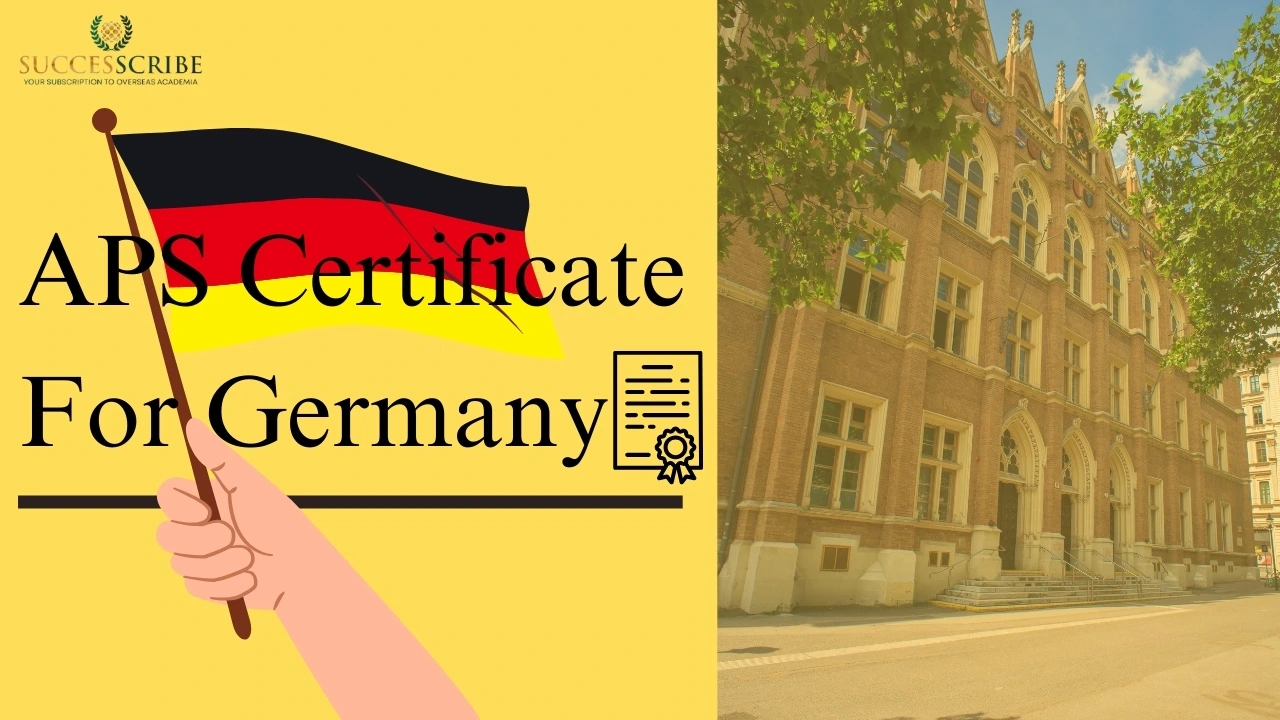Pursuing a Master’s in Psychology in Germany offers a unique opportunity to study in one of Europe’s leading educational environments. Enriched by its solid history of psychological research and practice, Germany has programs to suit every possible interest.
Many Individuals are curious to study human behavior, and for those, Germany is the right place, and a Masters in psychology in Germany is the right choice. Germany has some of the world’s top-ranked, award-winning universities in psychology, which give individuals full exposure to psychology studies. There is also a high demand for professional psychologists in the market, and they earn a good amount of money all around the globe.
Let’s Study the requirements, what are the top universities, and what scholarships are available for international students.
Top Universities for Masters in Psychology in Germany
Germany hosts some of the leading and world-ranking universities in the field of psychology.
Here are some of the Universities that are known worldwide and are the top universities for MS in Psychology in Germany or all over the world.
University of Heidelberg
- Program – Master of Science in Psychology
- Overview – University of Heidelberg ranks 34th globally for psychology. The University of Heidelberg is known for its comprehensive curriculum and also its strong research focus.
Humboldt University of Berlin
- Program – Master of Science in Psychology
- Overview – A leading research university in Europe, Humboldt University offers many specializations. Strong research training and great practical experience are guaranteed with the University Master’s program. 48th in the world rankings for Psychology
University of Freiburg
- Program – MSc in Psychology
- Overview – University of Freiburg conducts one of the best Master’s programs in Psychology for research and professional clinical service.
Ludwig Maximilian University of Munich
- Program – Master of Science in Psychology
- Overview – LMU Munich has a comprehensive program with good opportunities for interdisciplinary research. The university has a strong and academic solid reputation in psychology.
Technical University of Dresden
- Program – Master of Science in Psychology
- Overview – Being a vigorous program oriented more toward theory and its application, the psychology section of the Technical University of Dresden stands high with its pioneering contributions in research and very high academic standards.
Also Check: Top Universities in Germany for Masters in Finance
Admission Requirements Masters in Psychology For Indian Students
To get admission into Masters in Psychology in Germany For Indian Students, candidates must require to satisfy these requirements :
Academic Qualifications
Masters in Psychology in Germany usually requires a psychology Bachelor’s degree or an equivalent course. master’s programs can sometimes admit applicants with other qualifications if their studies relate to psychology in one way or another.
Language Requirements
Most of the programs are in German and thus often demand excellence in the German language. There are just a few programs taught in English for students who don’t know the German language – Some of the commonly accepted language tests by most institutions are:
TestDaF- Normally, most institutions demand that students score at least TDN 4 in all four sections for admission.
DSH- Most usually, the minimum that is demanded for the DSH test is DSH-2.
TOEFL/ IELTS: For English-taught programs, an applicant should hold a TOEFL score of at least 80 or an IELTS score of 6.5.
Documents for Application
The most common documents an applicant will need to provide the university with include:
Transcripts: Student scores of former educational levels.
CV/Resume: A detailed document noting the student’s academic and job experience.
Letter of Motivation: A document with a statement describing the interest the applicant has in the program and further career goals.
Statement of Purpose: A strong statement of Purpose is also needed describing the purpose of studying their convenience to the German authorities.
Letters of Recommendation: Academic or professional references for the applicant regarding suitability for the program.
APS Certification: Nowadays APS Certification is mandatory for all international students.
Also Check: Cyber Security courses in Germany for International Students
Fees for Masters in Psychology Program in Germany
Fees for Masters in Psychology in Germany vary whether you pursue a Public University or a Private. Germany is famous worldwide for its High-Quality Education at low cost.
Around from all corners of the world students come to Germany to get exposure to it.
- Public Universities – Among the leading benefits of studying in Germany is the fact that the public universities charge significantly low tuition fees. As of 2024, most of the public universities in Germany were free to charge their students tuition fees as far as their Master programs were concerned. Students just need to give the semester contribution, which would be inclusive of the administrative and student service costs.
- Semester Contribution for Public Universities – €250 – €350 per semester
This includes administrative fees, student union membership, and the public transport pass.
- Private Universities – While public universities are low-cost, private universities in Germany do charge a fee. It can be considerably high from one institution/program to another.
- Tuition fees – €10,000 – €20,000 per year
Scholarships for Master of Psychology Studies in Germany
There are a number of Scholarships available for students who are pursuing Masters in Psychology in Germany. These scholarships and their Eligibility are as follows:
DAAD Scholarships
The German Academic Exchange Service (DAAD) rolled up a number of scholarships for international students doing their Master’s in Germany. The scholarships are highly competitive and of the nature of funding the student for the living and travel costs.
Type: Full scholarships open to international students, cover living costs, travel expenses, and insurance.
Eligibility: Excellent academic results and research proposal.
Application: Online application form, updated academic transcripts, motivation letter, and language proficiency.
- Erasmus+ Program
This program supports students from countries in the EU who are studying in Germany by giving out financial support for the purposes of covering living and travel costs.
Type: By-the-month grant, ranging between €300-500 based on the student’s home country and financial need.
Eligibility: To EU students at the Master’s level and currently enrolled in an exchange program.
Heinrich Böll Foundation Scholarships
Heinrich Böll Foundation is a scholarship which is awarded to the international students’ basis of their academic success and social commitment.
Type: The scholarship is provided in the form of a monthly stipend of about €750 along with a study and research subsidy.
Eligibility: For those international students that are academically outstanding and committed to furthering social causes.
An application form, academic transcripts, a motivation letter, and two letters of recommendation may form a part of the application.
Deutschlandstipendium
This is a merit-based scholarship and hence is open to any student from any part of the world.
Type: Each student receives €300 a month, which is valid for one year.
Eligibility: The only criterion for the awarding of the scholarship is top-class performance and an achiever; this belongs to Germans and Internationals.
Application: Mostly, applications are sent to the concerned universities, and the criteria and procedure for awarding the Deutschlandstipendium vary from institution to institution.
Institutional Scholarships: From Individual Universities
The universities themselves sometimes provide scholarships or grants to aspirants with exceptional academic achievement, to those requiring financial support, and even to those who have specific research interests. The University of Heidelberg offers several scholarships for its international students on the consideration of exceptional academic results and research proposals
Job Prospects After Masters in Psychology from Germany
There is a high demand for professional psychologists in Germany and here are some job roles graduates can pursue after doing their Masters in Psychology in Germany.

Clinical Psychologist
- Clinical Psychologists provide counseling and also treatment to the people regarding mental health issues.
Organizational Psychologist
- They generally work in HR departments or consultancy. Works on improving productivity and employee well-being.
Educational Psychologist
- They identify and assess learning difficulties, upon which they intervene with appropriate strategies.
Research Psychologist
- Research psychologists conduct and study general knowledge concerning human thought and action. Research psychologists work in a university setting, independent research organization, or business.
Neuropsychologist
- Studies the relationship between brain function and behavior.
Program Duration and Format: Master’s Program in Psychology
Master’s in Psychology in Germany is normally two years and includes four semesters. Normally, these programs are full-time. There could be part-time programs at some universities; however, the course structure comprises a combination of lectures, seminars, and applied training with practical research.
Core Modules
Most of the core modules will generally be in the following topics:
Cognitive Psychology: The science behind mental processes such as perception, memory, and problem-solving.
Developmental Psychology: Study of how people grow and change psychologically through their lives.
Clinical Psychology: Emphasis on mental illness diagnosis and treatment.
Social Psychology: Study of how people are influenced by other people around them and by their social interactions.
Specialization
The majority of the time, a student can decide to obtain one of these specializations:
Clinical Psychology: emphasis on mental illness diagnosis and treatment.
Organizational Psychology: Study of workplace behavior and the disposing of staff members in a workplace.
Educational Psychology: Science of how people learn and the best practices for teaching.
Neuropsychology: Study of the relationship between the brain and behavior; study of cognitive function.
Conclusion
A Masters in Psychology in Germany is an excellent opportunity for both personal and professional development. Germany hosts one of the best environments to build a career out of psychology studies, since education is of high quality, fees are very low, and the scientific field is strong. By choosing the right program and meeting admission requirements, students can enjoy the best education and bright future in the field of psychology.
Masters in Psychology in Germany would be considered as one of the most strategic and top choice by individuals. Along with studies students get exposure to make connections with international. Germany is a hub of innovation and technology. So let’s start your journey with more energy and more exciting way.
Related Post
Masters in Marketing in Germany
Masters in Chemical Engineering in Germany
Automotive Engineering For Indian Students
Masters in Management in Germany













[…] PostMasters in Biomedical Engineering in GermanyMasters in Psychology in GermanyMasters in Chemical EngineeringMBBS in Germany for Indian […]